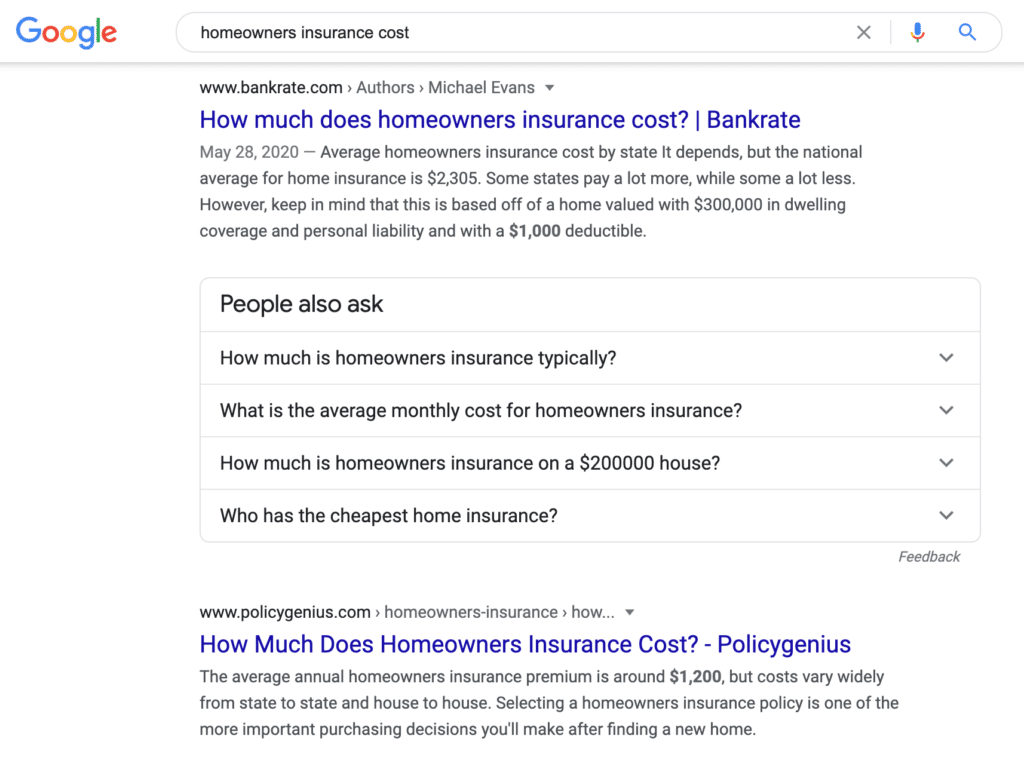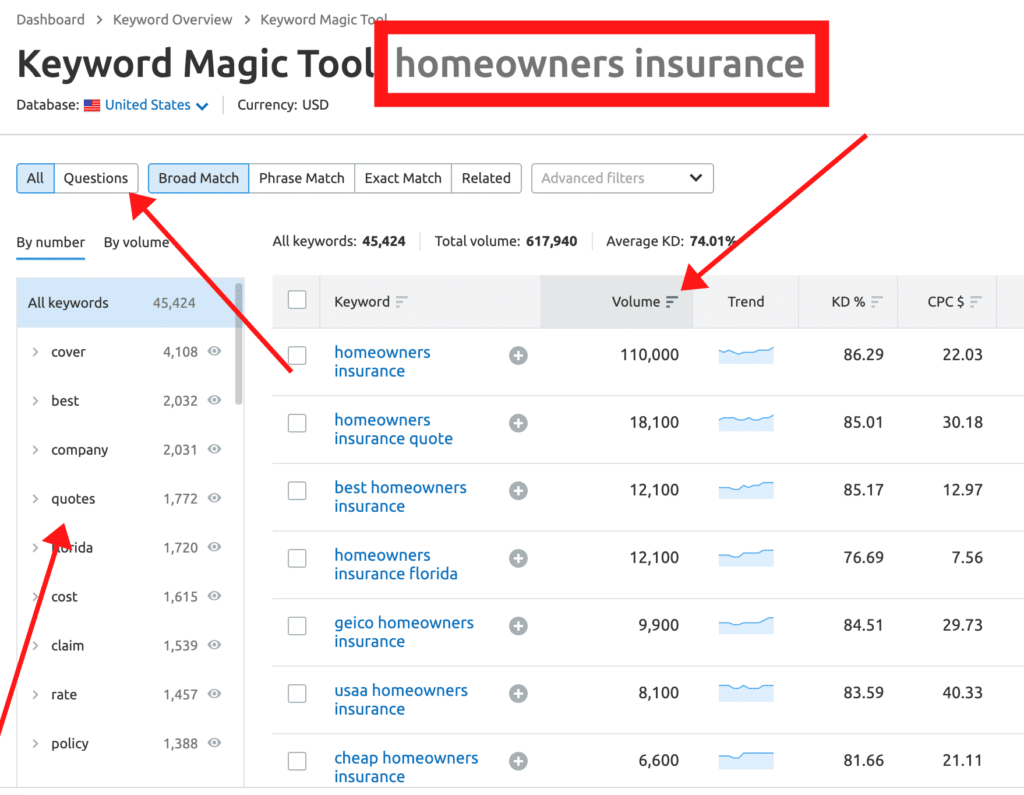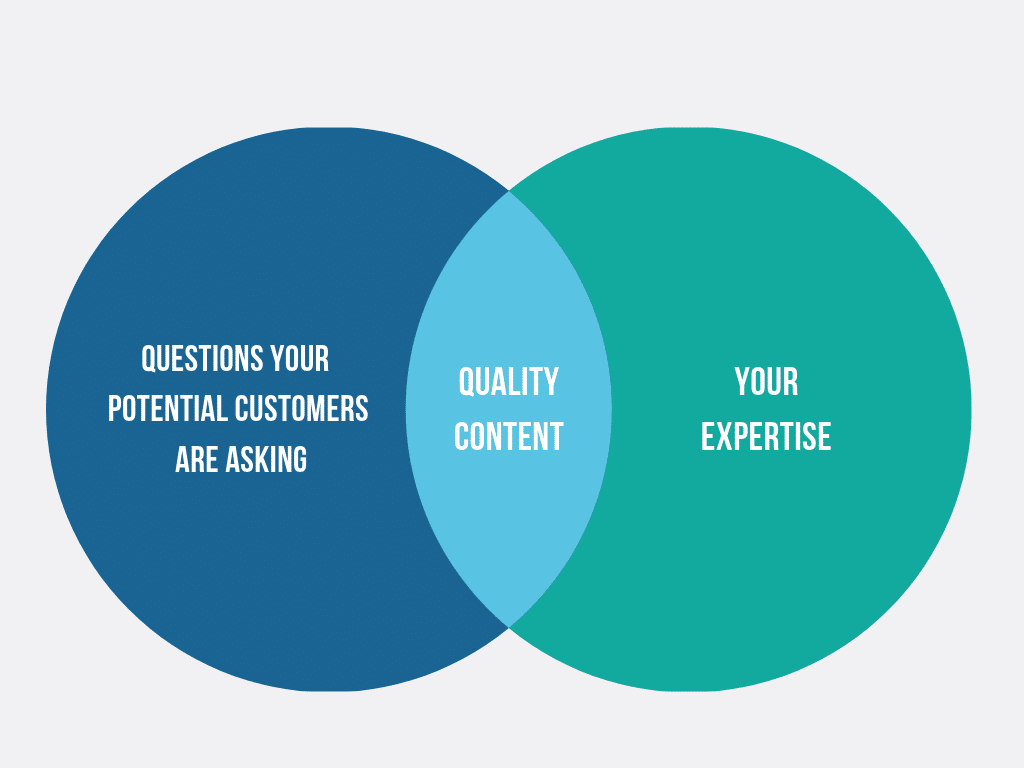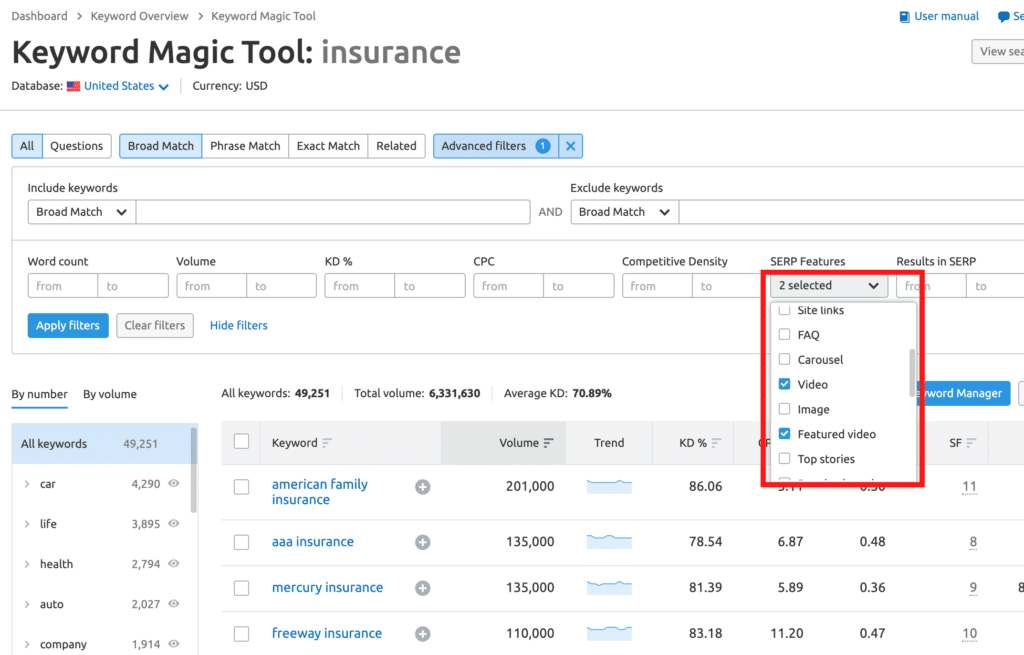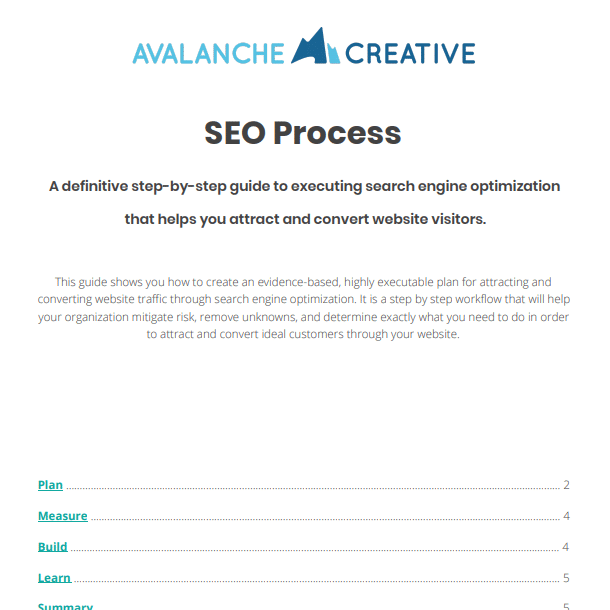SEO for Insurance Agencies: A Complete Guide
Category: Industries We Serve, Industry Guide | Tags:
Table of Contents
An Example of How Insurance Agency SEO Works
Let’s set the stage for this guide. We want to establish why SEO is so important to insurance agencies and of course, we’d like to establish our credibility as an SEO agency that offers Insurance Agency SEO services.
We’re going to look at the search term: homeowners insurance cost.
We searched that term in Google and here are the top organic results as of January 2021:
Below all the ads are organic links from Bankrate.com, Policygenius, and Allstate. All of these companies offer insurance policies.
For these companies, this is a fantastic content strategy that is bringing in a ton of valuable, organic traffic.
Consider the type of person that would search for the cost of homeowners insurance:
- They are probably thinking about buying their first home and are interested to know how much their homeowners insurance will cost them.
This is the type of person that these businesses want to get in front of.
By offering a great, free resource in a landing page that has links and tools to calculate how much homeowners insurance costs, they are attracting their ideal customer to their site.
If you take a look at the Policygenius page, they offer charts and graphs that break down average homeowners insurance costs by state, as well as by company.
Google understands that people are unique and therefore they want to offer a resource that can best match who they are, what they need, and fulfill the searcher’s intent.
What is user intent or search intent?
User intent is what a user online intended or wanted to find online when they typed their search term into an online search engine.
The intent of someone searching “homeowners insurance cost” is pretty clear. What makes working hard to get a page to rank for that term so powerful is that the person(s) most likely to be looking for this information are highly likely to need what Insurance.com, Policygenius, or Allstate has to offer.
This is a great example of a great Insurance SEO and content strategy executed for an Insurance Angency.
If you can understand and empathize with your target audience you’ll be able to perform better keyword research, which will lead to more opportunities to create great content for your audience.
Continue reading to find out how your insurance agency can bring valuable traffic to your website through evidence-based Insurance SEO.
Why SEO for Insurance Agencies?
In short, it works. Insurance Agencies can generate more sign-ups, meetings, and revenue by taking advantage of organic search. Insurance products solve some kind of problem. People go to search engines to solve their problems.
The better that Google and other search engines get at helping people solve their problems by suggesting solutions like your services, the more valuable SEO becomes.
People trust in search engines more and more as they interact with them and become more comfortable relying on them to identify solutions.
According to a Search Engine Land article, 53% of all site traffic on the internet is organic.
If you aren’t investing in your search engine real estate, you’re missing out on traffic that can convert and grow your insurance agency.
How to Market an Insurance Agency
The key to marketing success for your insurance agency is in identifying the problem your services solve and educating the market on how exactly they solve their problems.
Use Customer Empathy to Market Your Business
We always tell insurance agencies that we work with to focus on their customers first. In order to successfully execute digital marketing, you need to know more and care more for your customer than your competition.
That may mean you invest in SEO and content marketing. Invest in content that will help your customer before they’ve made a buying decision.
Online content isn’t just a blog post anymore. It’s images, video, slideshows, web applications, and more. All of this content can help establish your brand as a leader in your space and make your services more desirable.
Imagine being able to solve a problem for your customer before you’ve talked to them. Great blog posts or online tools can do that. Helping them first doesn’t just create an opportunity for a new customer, it creates a brand advocate.
The strategy, tactics, marketing channels you choose, time, and capital investments you make all need to hinge on your customer. Find out information about your customer like:
- What is their day-to-day like?
- What do they value most?
- What else do they search for online?
- What are they going to experience before they need your solution?
By listening to your customer and gaining empathy for your customer, you’ll start to get a clearer picture of how they might use search engines to find your solution and what type of content might attract them to your website.
In order to execute effective marketing for your insurance agency, you need to have good operations and sound strategy built upon an evidence-based plan. Do your research and plan the work before you work the plan. You can’t campaign yourself out of a bad strategy.
SEO Strategies and Tactics for Insurance Agencies
What is Insurance SEO?
SEO, or search engine optimization, for insurance agencies, is the process of getting quality, organic traffic to your site with the intent of converting that traffic into a new insurance customer. The tactics behind SEO for insurance don’t look all that different than any other industry.
On-Page, Off-Page, & Technical SEO
SEO can be broken down into three general categories; on-page SEO, off-page SEO, and technical SEO.
On-page SEO is mainly the content on your page. Keywords, titles, headings, meta descriptions are all SEO signals that are on a page of your website. Search engines want to make sure the content is relevant to the search term or keyword. Relevancy plays a big role in on-page SEO.
Off-page SEO is everything from other web pages that help a particular page on your site rank. There are several factors, but the biggest are backlinks or links from other sites to your site. It’s crucial to have a good volume and good quality or relevant backlinks to validate your trust and authority.
Technical SEO is, for the most part, all under the hood of your website. It’s making sure your website is developed so that it is crawler friendly, has an SSL certificate, loads fast, etc.
Meta Titles and Descriptions
Meta titles or page titles are the titles of each individual page or post on your website. These are not necessarily visible on the page, but they are visible to the search engines. You have control over this title and what it says so it is imperative that you optimize these titles to stand out.
Meta descriptions or page descriptions are another HTML attribute that provides a summary of a page or posts content. These can also be optimized for the search engine results page, but Google will often manipulate them for certain search terms.
Keyword Research
Keyword research is a crucial part of search engine optimization. A keyword research tool is imperative to identifying quality keywords, identifying user intent, and determining your overall content strategy.
Using a keyword research tool, you can shortlist your keywords. We use SEMRush to do keyword research.
In the screenshot below you’ll see the SEMRush Keyword Magic Tool. This allows us to enter a keyword (in this case “homeowners insurance”) to start our keyword research process.
- This is where you enter your keyword. We tend to start with a short-tail keyword (a few words) and a broad match to get ideas.
- You can toggle keywords to just those in the phrase of a question, which is great for content ideas and making sure to fulfill searcher intentions.
- You can see a list of other words that are commonly included when the words homeowners and insurance are used.
- You can also see data on the competitive nature of the term and trends.
These are some of the most common features we use for keyword research, but there are several others to help you drill down on your strategy.
Keyword research can and should help your insurance agency get an idea of how big your market is and plays a crucial role in determining if it’s an investment worth making for your business.
Once you’ve done thorough keyword research, you’ll need to determine how to use keywords for SEO (read this guide for more on how to do that). Keep in mind the importance of search volume for your offerings. Low-volume keywords can be great if there are a lot of them, but if there is not a lot of low volume keywords, you’ll see that these keywords are harder to rank for.
Page Load and Mobile-friendliness
Your page load time is crucial not only to SEO but your potential customer’s experience. Google will promote sites with a faster page load speed if it enhances the user’s experience. This is especially important when loading over mobile devices, which are often being used on 3G and 4G connections with slower download speed.
Keep the size of your images and other large media minimal and work with an experienced web developer to optimize your website for speed.
Learn more about page load speed.
Your website needs to be mobile-friendly. Your target audience is searching for you on mobile devices and with Google’s mobile-first indexing, you can’t ignore the importance of a mobile-friendly website. Mobile-first indexing is essentially Google stating that they are prioritizing mobile-friendly sites when people search on their mobile devices.
Web Design
Your website design is important to the user’s experience. If your potential customer can’t easily find what they are looking for, you may miss out on lead generation. It’s important to consider internally linking between pages to add context and help the user navigate.
When it comes to web design for insurance agencies, it can be challenging to use thoughtful architecture. Make sure to plan your website content carefully and group topics together. Thorough keyword research can help.
Link Building
Link building is the process of acquiring backlinks or links from other sites to your website. This is really important to build your expertise, authoritativeness, and trust. Generating links back to your site is important when the market competition demands it. Oftentimes, great content alone can win out and get you the visibility you need in the search results.
Social Media
Utilizing your social media channels, you should be promoting the content you publish on your website. Creating useful content on your website for the purpose of attracting people organically via the search engines is great, but you should also push it out to your audience via social media channels.
SEO Tools
When executing SEO, be sure to use available free tools like Google Search Console. Search Console allows you to manage your website to ensure it is being crawled and indexed. You can also see what keywords your site is getting impressions and clicks on.
Local SEO
Local search visibility is crucial for insurance agencies and for local insurance agents. Make sure you have a Google My Business profile verified and make sure it completely filled out. There are many ways to improve your SEO. Local ranking factors include;
- Relevancy – such as a search that contains “near me” when searching for an insurance agent or agency
- Trust – having reviews and responding to your reviews on Google My Business and other third party websites that will list your business
- Authority – have helpful content on your website that matches the intention of the local search.
Content Marketing for Insurance Agencies
Why do we bring up content marketing on a guide about SEO? Because an effective SEO strategy is incredibly reliant on great content. SEO and content go together like peanut butter and jelly.
The beginning of any effective content marketing strategy for insurance agencies begins on a foundation of a thorough keyword research process, which is also the foundation of great SEO.
Our keyword research process for insurance agencies is below.
How to Identify Content Marketing Ideas
Talk to Your Customer
While it’s true that you probably understand your services really well and can talk about them all day with a bunch of industry jargon, that most likely is not true of your customer. You probably know less about your customer and don’t know what words they use to describe what they need.
The best way to start to get ideas for content marketing is by asking your ideal customer the right questions. Start by surveying your current customers to get some more information about who they are, what they do, and how they think.
Your goal is to identify quality content that is attractive to your ideal customer that you could create. In the Venn diagram above you’ll see what we’re referring to.
Take the keyword “life insurance” as an example.
Who is searching for this? Is it a business that wants life insurance coverage for its employees, or is it someone looking for an individual plan? Or is it neither? Perhaps it is a business that already has a solution, but is looking for example language to use in communicating coverage to its employees.
The point is, you need to investigate keywords in order to come up with great content for them. Google and other search engines may not know their intentions either, so they are going to provide a mix of helpful options.
If you were to create a resource page that had something to cover all intentions, you’re more likely to rank because you’ll be providing quality content that solves a problem for the searcher.
Do Keyword Research
By using a keyword research tool you can start to gather great content marketing ideas to attract insurance leads.
In the screenshot above you can see on the left that you can drill down into subtopics of “homeowners insurance.” People look for rates, costs, quotes, and policies.
If you want to start to dominate all that “homeowners insurance” traffic, you’ll need to make sure to cover the topic well and include links and information on all the different types of homeowners insurance policies.
When you write great content that is related to what you offer, you are supporting your domain authority online. By focusing on writing quality content on all the questions, topics, and subtopics people search for that are related to your subject matter, you’ll begin to dominate the search engines.
Create a Shortlist
As you use your keyword research tool, add keywords to a shortlist. These can be high-intent, low-intent, short-tail, and long-tail. Add any that seem relevant for now. You can chisel them down later. The point of creating a big list is to get a good overview of your entire potential and you can create a content plan based around all of your keywords.
Look at Content Types in SERPs
Content is not just written copy and your target customer doesn’t want to just read an article. It often makes sense to support your content with images and video and interactive tools like calculators and quizzes. But, don’t just take our word for it.
With a tool like SEMRush, you can determine which SERP features show up on each of your keywords. In the screenshot below, we have filtered our keywords by those that include a video in the search engine results page. If we search any of these terms a video will show up in Google.
This is important to note because what the search engines provide in search results should guide what you include on your web pages.
You need to have great content for your target keyword and using available keyword data can help you determine what that high-quality content should look like.
Our SEO Services: Websites That Increase Traffic & Conversions
We create and execute Insurance SEO & content marketing plans for insurance agencies.
Attracting traffic to your insurance agency website can be a challenging and daunting task. There are a lot of moving parts to your website. It’s a living organism that requires constant attention and maintenance. And then you have to think about quality, fresh content that you can contribute. Writing great, authoritative content takes time.
But, it can be worth the investment to your insurance agency with the right SEO strategy and content marketing strategy.
Evidence-based Insurance Marketing
At Avalanche Creative, we create evidence-based, highly executable search engine and content marketing plans for insurance agencies. Our process takes the mystery out of the question, “should I invest long term in insurance SEO and content marketing?” and provides a bullet-proof plan for how to execute insurance SEO and content strategy that drives more traffic, more qualified leads, and builds your brand’s authority.
Our SEO services mitigate the risk of a bad investment in search engine optimization. We do this by researching and planning more thoroughly than anyone else. We make sure your SEO and content marketing plan is truly investable for your insurance agency. Reach out to us today to learn about how SEO can help your business.
Share this article:
The Avalanche Email: Fun. Simple. Educational. No Selling.
Learn Result-focused SEO & Content
Join over 2,272+ others who get one email every Wednesday with simple instructions on how to get more website traffic and leads through SEO and content marketing. (Learn more about the email)
Keep Learning
Creating the Perfect SEO Content Template in Google Docs
Learn how to create an SEO Content Templates in Google Docs to help drive new traffic to your website from the search engines. SEO Content Templates provide specific recommendations and directives for creating new content on your website with the purpose of improving your SEO.
How To Show Up in Gemini (And Win More Local Jobs)
Show up in Gemini when homeowners search for landscaping services. Build the right signals on Google and your website to win more qualified local jobs.
How to Run Google Ads for Landscapers: A Complete Guide
Learn how to set up Google Ads for landscapers, attract qualified leads, and win more local jobs with this step-by-step guide.
🏔️ Watering > Planting New Seeds
Your next marketing win may already be on your site. Learn how to optimize existing pages for better rankings, traffic, and results.
The Recipe vs. The Meal
Your customers buy the experience, not the product. Discover a simple way to shift your message from ingredients to the full meal.
What’s the Best CMS for Landscaping Businesses?
Compare the best website platforms for landscapers. Learn the pros and cons of Wix, Squarespace, and WordPress, and why WordPress is best for long-term SEO.

